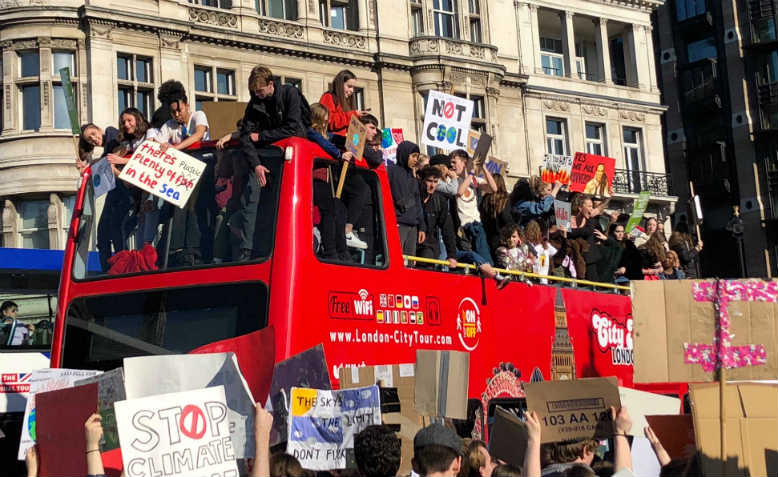 Students occupy a tour bus in Parliament Square, Friday 15 February 2019. Photo: Shabbir Lakha
Students occupy a tour bus in Parliament Square, Friday 15 February 2019. Photo: Shabbir Lakha
School students brought Westminster to a standstill as around ten thousand protested against government inaction on climate change, reports Richard Pratt
For many school students around Britain, today wasn’t an ordinary school day, but a day to highlight impending ecological catastrophe.
In response to the global #FridaysForFuture movement, school students all over the country left school and rallied in over 38 towns and cities as part of a coordinated school walk-out led by Youth Strike 4 Climate. In London, up to 10,000 youngsters descended on Parliament Square, blocked the roads, occupied buses and marched up and down Whitehall.
From as early as 10.30am, with young protestors flooding the square from all sides, it was clear that this was not going to be the sedate affair that a lot might have expected.
This was a dynamic and hugely diverse cross-section of the generation forever being told to put their phones down and go outside. And here they were doing precisely that, bringing Westminster to its knees in the process.
The premise of this vibrant mass movement is simple: millions of young people are realising the severity of the climate crisis we’re facing and are demanding that the Government address the matter with the sincerity it warrants.
This movement is significant. It plainly shows an ever-growing sense among young people that a system so fundamentally and irredeemably committed to accumulation – even when this is at the expense of the planet – is a system whose rules must be broken in order to avert disaster before it’s too late.
And time is very much of the essence, given that it is now already last year that the UN’s Intergovernmental Panel on Climate Change issued an alarming 12-year ultimatum.
The political clarity displayed by these kids will have caught a lot of people off-guard. They know who’s driving us into climate disaster, and they know who benefits from this. And, perhaps more importantly, they know exactly who they want leading the way…
The energy behind the strike demonstrates an exciting departure from the kind of ‘reflexive impotence’ that Mark Fisher identifies in an otherwise bitterly demoralised British youth. The students out on the streets today are clearly not resigned to their fate – they know there is an alternative – and as such they deserve our full support.

